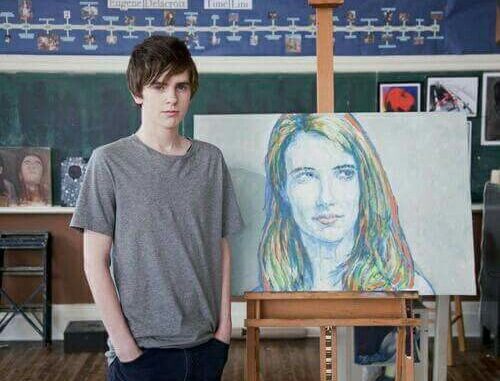
Shaun’s love story is no ordinary tale. From their first awkward encounters in Season 1, where Shaun’s earnestness clashes with Lea’s free-spirited nature, to the soul-stirring moments of commitment in later seasons, their relationship is a masterclass in storytelling. Highmore’s performance captures Shaun’s struggle to express his emotions, his fear of rejection, and his unwavering devotion with a subtlety that pierces the heart. When Lea confesses her feelings in Season 3’s “I Love You,” the raw emotion in Highmore’s eyes speaks volumes, turning a simple scene into a fan-favorite moment. Their journey isn’t a fairytale; it’s real, messy, and beautiful, filled with misunderstandings, growth, and the courage to love despite differences. Shaun’s autism shapes his perspective, making his expressions of love—whether through a carefully planned date or a quiet gesture—uniquely poignant.
Beyond romance, The Good Doctor explores love in all its forms. Shaun’s bond with Dr. Aaron Glassman (Richard Schiff), his mentor and surrogate father, is a cornerstone of the series. Their relationship, tested by disagreements and strengthened by mutual respect, showcases Highmore’s ability to convey deep emotional connections. Shaun’s friendships with colleagues like Dr. Claire Browne (Antonia Thomas) and Dr. Morgan Reznick (Fiona Gubelmann) add layers to his journey, proving that love extends beyond romance to community and self-acceptance. Highmore’s chemistry with the ensemble cast creates a hospital that feels like a family, flawed but fiercely supportive.

What sets The Good Doctor apart is its refusal to reduce Shaun to his diagnosis. The show, streaming on Hulu and ABC, celebrates his autism as a strength, not a limitation. Shaun’s savant abilities allow him to visualize medical solutions in ways others can’t, solving cases that stump seasoned doctors. Yet, it’s his humanity—his determination to connect, his quiet humor, his relentless compassion—that makes him a hero. Highmore’s nuanced performance, honed through years of roles in Bates Motel and Finding Neverland, brings Shaun’s quirks to life: his love for pancakes, his methodical approach to problem-solving, and his earnest questions about life. These details, paired with Highmore’s ability to convey Shaun’s inner world, earned him critical acclaim and a devoted fanbase.
Highmore’s brilliance extends beyond acting. As a writer and director for The Good Doctor, he shapes the show’s narrative with a keen eye for storytelling. His directorial work in episodes like Season 4’s “Irresponsible Salad Bar Practices” highlights Shaun’s growth while balancing the ensemble’s stories. His writing, particularly in Season 2’s “Hello,” weaves humor and heartbreak, showcasing Shaun’s evolving confidence. These contributions, combined with the show’s accolades—including NAACP Image Award nominations and a People’s Choice Award—cement The Good Doctor as a cultural touchstone. It’s a series that challenges stereotypes, asking viewers to rethink what it means to be “normal” and celebrating differences as strengths.
The Good Doctor spans seven seasons of gripping medical drama and profound personal growth. Each episode is a tapestry of high-stakes surgeries, ethical dilemmas, and Shaun’s quest to prove himself in a world that often underestimates him. The show’s ability to balance intense medical cases with emotional depth keeps viewers hooked. Whether it’s Shaun saving a patient with an unconventional solution or navigating the complexities of love, every moment is crafted with care. The series’ diverse cast, including Hill Harper as Dr. Marcus Andrews and Christina Chang as Dr. Audrey Lim, adds richness to the storytelling, making St. Bonaventure a microcosm of human experience.
